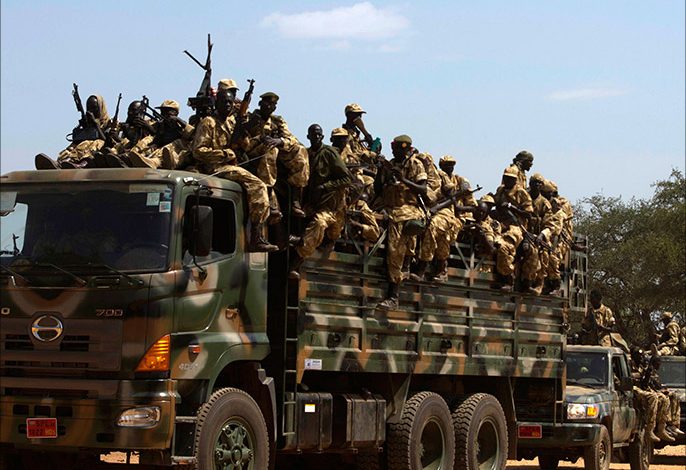Does Sudan Get Affected by the Escalating Security Situation in Juba?

Report – Al-Nour Ahmed Al-Nour
Following concealed disputes among leaders in the South Sudanese government, the security and military situation in the country has escalated, leading the authorities to arrest officials close to Vice President Riek Machar.
An armed group attacked the town of Nasir in Upper Nile State, raising concerns about the potential repercussions for Sudan, given that the two countries share the longest border in Africa.
Juba, the capital of South Sudan, is witnessing growing tensions after a series of arrests of officials and the advance of armed groups in the strategically located border town of Nasir.
The situation escalated when the security authorities detained Deputy Chief of Staff Gabriel Duop Lam, who is allied with the opposition Sudan People’s Liberation Movement (SPLM-IO) led by Vice President Riek Machar.
In a subsequent move, Oil Minister Puot Kang Chol and several SPLM-IO members were arrested at their homes, while security forces continued to surround Machar’s residence.
Tension and Concerns
The arrests followed a high-level presidential meeting held to address rising security concerns in the states of Nasir, Western Equatoria, and Western Bahr el Ghazal.
In Upper Nile State, the “White Army,” a militia composed of members from the Nuer tribe — the second-largest ethnic group in South Sudan — announced that it had taken control of Nasir, a town near the Ethiopian border, after clashes with government forces.
These developments heighten fears about the future of the peace agreement signed between President Salva Kiir Mayardit and his deputy Riek Machar in September 2018, and whether the country might slide back into a cycle of violence, given the persistent divisions among the power-sharing factions in Juba.
The border between Sudan and South Sudan stretches for 2,010 kilometers, from South Darfur in the far west, bordering the Central African Republic, through East Darfur, West and South Kordofan, White Nile, Sennar, and the Blue Nile region in the east, adjacent to Ethiopia.
A Sudanese official told Al Jazeera Net that certain leaders in the South Sudanese government, who have economic ties with the leadership of the Rapid Support Forces (RSF), have contributed to recruiting mercenaries and facilitating arms smuggling across the shared border.
The official, who requested anonymity, revealed that the South Sudanese government acknowledged that the RSF recruited thousands of mercenaries from South Sudan, including from opposition factions unaffiliated with Juba. He added that South Sudan also fears that returning mercenaries armed with weapons could destabilize their country.
A previous report by UN experts also indicated that the RSF relied on a complex financial network to support its military efforts, with supply lines extending through Chad, Libya, and South Sudan.
Partial Control
In a move coinciding with the developments in South Sudan, the Sudanese army advanced on Wednesday and regained control of the last RSF strongholds in the areas of Daly and Mazmoum in Sennar State. The army also seized control of the strategic Taboon area in White Nile State and several towns in the Blue Nile region near the South Sudanese border.
In a statement, army spokesperson Brigadier General Nabil Abdullah said that the military operations in the Blue and White Nile regions, Sennar, and the Blue Nile region had “destroyed the remnants of the Janjaweed” in the areas of Daly, Mazmoum, Jafrat, Malisa, Qali, Abu Arif, Qarbain, Roro, and Taboon, which were “recovered by force.”
Regional Impact
Political analyst Ibrahim Shaqlawi believes that the unfolding situation in South Sudan will have a negative impact on stability in the region and Sudan due to the geographical and historical ties and shared interests between the two countries. Therefore, Sudan must work to secure its borders with its southern neighbor.
Shaqlawi explained to Al Jazeera Net that South Sudan’s economy depends on oil revenues, which are exported through Sudanese territory and ports. Any disruption would have economic repercussions for both countries. Additionally, any deterioration in the security situation in Juba could lead to an influx of refugees into Sudan, putting pressure on the country’s already limited resources.
Border Security
Shaqlawi also expects that increased instability in South Sudan could lead to greater activity by the RSF and arms smuggling across the shared border, presenting a security challenge for Sudan.
He suggested that Sudan should revive its previous efforts to mediate between the rival factions in South Sudan to support stability, either directly or through a regional initiative.
Political analyst and African affairs expert Mohammed Alaa Al-Din said that Sudan had already suffered from the situation in South Sudan, as the RSF exploited the security vacuum and controlled border crossings with South Sudan near the Darfur region to recruit mercenaries and smuggle weapons.
Al-Din noted that the RSF also used nearby South Sudanese markets to sell looted goods from Khartoum and Gezira State, with the proceeds used to finance field commanders.
According to Al-Din, it is not in Sudan’s interest for chaos to erupt in South Sudan because Sudan lacks control over large parts of its borders. This calls for diplomatic and security engagement with Juba to mitigate the negative effects of the conflict.
He added that Sudan should encourage the rival factions in South Sudan to prevent a resurgence of large-scale violence, which previously killed 400,000 people. He also recommended strengthening surveillance over RSF supply lines that pass through South Sudan.
Furthermore, Al-Din stressed the importance of preparing evacuation plans for Sudanese nationals in South Sudan in case the security situation deteriorates. He noted that over 4,000 Sudanese citizens were evacuated in recent months after attacks on Sudanese nationals in retaliation for violence in Gezira State, which had affected South Sudanese citizens.
Source: Al Jazeera Net



